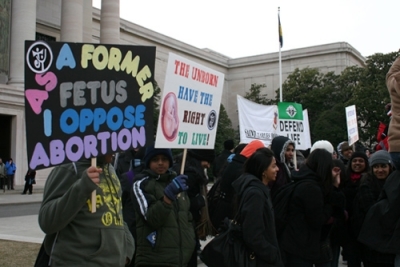The Need for Clarity and Comity in the Abortion Debate

The reaction to my last Op-Ed of October 11, The Proper Position for the Church: Anti-Abortion and Pro-Choice, was revealing to me for a few reasons. It seems that any attempt at a discussion on abortion, especially if it forwards an alternative to the current (public) position held by the church, is akin to touching the dreaded third rail. This is evident because the editorial board of the Christian Post deemed it prudent to add a disclaimer emphasizing its prolife philosophy while allowing a debate on the issue. I appreciate very much that allowing, and I am encouraged that reasonable voices are not censored because of differing views on non-essentials.
That, however, exposed the problem we run into by failing to adequately define the meaning of the labels we use to circumscribe the debate. Pro-choice does not necessarily mean pro-abortion. In fact, there are many born-again, spirit-filled, walking-with-the-Lord, faithful Christians who are firmly anti-abortion but believe that a woman's right to choose should not be prohibited. The truth is that Christians, of whatever stripes, are anti-abortion. Sure, as with any group, there is always a spattering of contrarians, but within the Christian faith the overwhelming belief is anti-abortion.
One commenter decided not to even read the op-ed after seeing the title because he or she thinks one has to be either prolife or pro-abortion. In the debate, the term pro-life has been narrowly defined to mean anti-abortion. Well, guess what? That would apply to all the anti-abortion Christians mentioned above, even to those who believe that a woman has the right to choose. Divisions are created, aspersions are cast, and bitterness against each other ensues because this fact is not understood or appreciated. There is blight of binary thinking that stymies any meaningful debate without the unpleasantness of irreligious sniping.
The lack of clarity on what it means to be pro-life was evidenced in July of this year with the article by Steven D. Greydanus, in the National Catholic Register. In it, he mentioned competing articles by two Catholic writers:
Within the last week, the term "pro-life" has come under crossfire from two Catholic writers coming from almost diametrically opposed perspectives.
"The Pro-Life Movement Has Lost," writes Rebecca Bratten Weiss at Patheos, while at CatholicVote.com Eric Sammons explains "Why I'm Through Being 'Pro-Life'."
Each article is, in effect, the other's worst-case scenario.
For Weiss, the pro-life movement has lost because it no longer has a moral platform to stand on, no longer has any semblance of a claim to care genuinely for all lives, for women as well as babies, for the born as well as the unborn.
For Sammons, it's precisely the insistence that being pro-life necessarily entails anything other than opposition to abortion that has ruined the term: ...by calling every issue a "pro-life" issue, we dilute and fracture the brand. We make other, less important issues as important as the abortion issue. We needlessly divide pro-lifers over prudential issues about which we should be able to respectfully disagree.
In my view, those writers are victims of the imprecision of the meaning of pro-life. They are both anti-abortion, but the depth of the issues of abortion, which is so much more than the simplicity with which most of us think about it, forced them to vie with each other.
If we are going to remain entrenched in our own positions without trying to understand each other, then we are going to miss the kernel of unity in our beliefs on abortion. There has to be Christian comity. We must take the time to listen to and understanding each other's reason for why we believe as we do on this issue. There is really more than a kernel of unity, because, as stated earlier, we are all overwhelmingly anti-abortion. On that we ought to be clear.
What we ought to try and understand are the reasons why one is anti-choice on the issue, and the other is pro-choice. I cannot overemphasize the importance of appreciating that this is not a simple either/or issue; it is often complicated and complex to navigate. There are strong religious convictions on both sides, but that does not make one side less or more "Christian" than the other.
Being anti-choice or pro-choice cannot be exclusive in each case. Is there never a time when it is morally acceptable to have an abortion? Is it always morally acceptable to have an abortion? I believe most Christians would say there should be exceptions to both. I also believe that just like the contrarians mentioned before, only a few from either camp would say "yes."





















